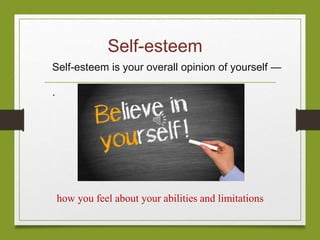
Boost Your Self-Esteem
- 1. Self-esteem Self-esteem is your overall opinion of yourself — . how you feel about your abilities and limitations
- 2. Where Does Self-Esteem Come From
- 3. • Parents, teachers, and others. • The voice in your own head • Learning to do things
- 4. Self-esteem begins to form in early childhood. Factors that can influence self-esteem include: Your thoughts and perceptions How other people react to you Experiences at home, school, work and in the community Illness, disability or injury Age Role and status in society Media messages Factors that shape and influence self-esteem
- 7. Benefits of healthy self-esteem With healthy self-esteem you're: Assertive in expressing your needs and opinions Confident in your ability to make decisions Able to form secure and honest relationships — and less likely to stay in unhealthy ones Realistic in your expectations and less likely to be overcritical of yourself and others More resilient and better able to weather stress and setbacks
- 9. How Can I Improve My Self-Esteem? • Be with people who treat you well. • Say helpful things to yourself • Accept what's not perfect • Set goals and work toward them • Focus on what goes well. • Give and help
- 10. Exercise Can Boost Your Self-Esteem Who I Am: List the top 5 things that made you smile today. Reflect on why these occurrences brought you joy. What I Need: What and/or who could you not live without? Reflect on this feeling of need. What I Desire: If you had the ability to accomplish one thing tomorrow, what would it be and why?
- 12. This worksheet has 2 parts: This first section provides a step-by-step approach to designing meaningful, positive affirmations that you can commit to repeating. Use these tips and examples to help you come up with some affirmations as an initial step.
- 13. Designing Affirmations Tip • Phrase your affirmation as an “I statement”, beginning with “I am...” • Design an affirmation that represents a positive outcome. Avoid using avoidant language such as the word “not” in your affirmations. Example • I am a caring, supportive brother to my little sister • I am getting stronger at speaking French every single day